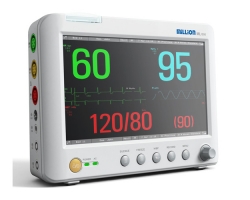Wechat QR code

TEL:400-654-1200

TEL:400-654-1200
Brief Knowledge Points of 24-hour Dynamic ECG
24-hour ambulatory electrocardiogram (24-hour ambulatory electrocardiogram) is a kind of long-term continuous recording and compiling analysis of the changes of human heart electrocardiogram in active and quiet state.
Including: ST level trend map, heart rate variability, data after physical exercise and differential diagnosis of various heart rate arrhythmias. Qualitative and quantitative diagnosis of heart rate arrhythmia and myocardial ischemia, determination of causes and nature of paroxysmal syncope, vertigo and palpitation, evaluation of drug efficacy and evaluation of pacemaker function. It can record all abnormal waves and detect all kinds of arrhythmias and asymptomatic myocardial ischemia in 24 hours. It provides accurate and reliable basis for the diagnosis of heart diseases. In clinical application, it has a high detection rate especially for early coronary heart disease. Monitoring method can move freely and arbitrarily when making dynamic electrocardiogram, which will not affect daily life. To do this examination, multiple electrodes were pasted on the front of the chest. The more electrodes, the more comprehensive the records were, generally less than 10. Wires are connected from each electrode sheet to a recording box. MeilunThis box has a strap on it. When you connect it and put it on your shoulder, you can go home. By the doctor's operation, the connection between the box and the wires and electrodes should be firm and not fall off. It doesn't affect activities, just be careful not to damage when moving, and sleep face up at night. The doctor will give you a notebook so that you can record the 24-hour situation in detail. For example, when to go upstairs, when to go to the toilet, when to eat, when to have chest tightness, chest pain, panic, shortness of breath and other uncomfortable feelings. The main purpose of such a long period of examination is to capture the changes of ECG when symptoms occur, and to analyze the changes of the day's central rate as a whole. Once symptoms occur at a certain time of the day, the next day when the doctor transmits the electrocardiogram recorded throughout the day to the computer, he only needs to input the time on the computer, and immediately calls out the electrocardiogram of that time to make accurate judgments (such as arrhythmia, myocardial ischemia, or symptoms without any problems, etc.). One thing to be reminded of is that you can't, like some people, dare not move since you bring your record box home. Otherwise, some of the anomalies will no longer appear. Examination is to detect abnormalities. If the occurrence of chest tightness, chest pain and so on is related to activity, you can intentionally exercise a little, so as to record abnormalities. Only then need to be accompanied, in order to prevent the occurrence of unexpected monitoring effect is often difficult to grasp an effective basis for diagnosis, but patients have obvious symptoms of conscious, doctors advise them to carry out dynamic monitoring of ECG.Meilun

1. Detection of occult arrhythmias: temporary arrhythmias, which occur in specific circumstances, are easily missed by conventional ECG. DCG can capture transient abnormal ECG changes, understand the origin, duration, frequency, occurrence and termination of arrhythmias, and synchronously analyze their relationship with clinical symptoms and daily activities.
2. Monitoring tachyarrhythmia: We can further understand the occurrence and termination of tachyarrhythmia, whether it is accompanied by SSS syndrome or preexcitation syndrome (especially intermittent) and its classification.
3. Observation of bradyarrhythmia: To understand its main manifestations and whether it has sinoatrial node dysfunction. For fast-slow syndrome, DCG observation can help to select antiarrhythmic drugs, adjust dosage or consider other treatment methods, and provide objective basis for pacemaker installation and type selection.
4. Assist in judging the clinical significance of different types of ectopic rhythm or conduction block: To determine the treatment strategy by monitoring the frequency and severity of ectopic rhythm or conduction block with DCG.
5. To evaluate the efficacy of antiarrhythmic drugs: DCG is a reliable clinical index for the study and evaluation of antiarrhythmic drugs.
The most common cause of sudden cardiac death is ventricular tachycardia or ventricular fibrillation. Before the occurrence of sudden cardiac death, there are often ventricular arrhythmias with unstable ECG activity. It can only rely on DCG to find its occurrence regularity. For patients with mitral valve prolapse, hypertrophic or dilated cardiomyopathy and Q-T prolongation syndrome, DCG can find out the risk factors of sudden death in a timely and comprehensive manner, which is helpful for timely and effective treatment.
7. Assist in judging whether intermittent symptoms such as chest tightness, palpitation, vertigo, blackness or syncope are cardiogenic.
8. Continuous monitoring of 12-lead ECG by DCG has a high detection rate of myocardial ischemia and can be used for localization diagnosis, especially for atypical symptoms of myocardial ischemia. Myocardial infarction or asymptomatic myocardial ischemia has irreplaceable clinical value. The correlation analysis between ST-T changes and time-synchronized activities is helpful for judging the type of myocardial ischemia and selecting drugs. In addition, the type and frequency of arrhythmia accompanied by myocardial ischemia can be detected, and the possibility of sudden cardiac death can be predicted, so as to facilitate early prevention and treatment measures.
Patients should pay attention to:
1. After wearing a record box, patients can carry out daily activities, such as going to work, walking, simple housework, etc.
2. It is necessary to avoid intense physical exercise and contact with strong magnetic field and electric field so as to avoid the distortion of ECG waveform and excessive interference which may affect the diagnosis report.
3. To monitor the whole process, patients are required to record their diaries, their activity status and related symptoms according to time. A detailed and complete life diary is of great reference value for the correct analysis of dynamic electrocardiogram data.
4. Dynamic electrocardiogram (DCG) is often affected by the patient's position, activity, mood, sleep and other factors in the monitoring process. Therefore, the results detected by DCG should be combined with medical history, symptoms and other clinical data to make a correct diagnosis.